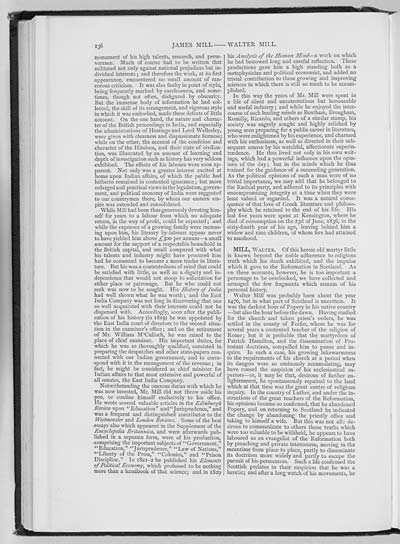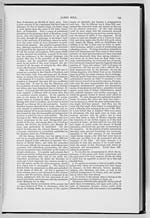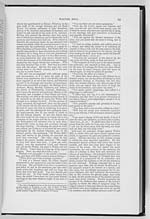136
monument of his high talents, research, and perse-
verance. Much of course had to be written that
militated not only against national prejudices but in-
dividual interests; and therefore the work, at its first
appearance, encountered no small amount of ran-
corous criticism. It was also faulty in point of style,
being frequently marked by carelessness, and some-
times, though not often, disfigured by obscurity.
But the immense body of information he had col-
lected, the skill of its arrangement, and vigorous style
in which it was embodied, made these defects of little
account. On the one hand, the nature and charac-
ter of the British proceedings in India, and especially
the administrations of Hastings and Lord Wellesley,
were given with clearness and dispassionate fairness;
while on the other, the account of the condition and
character of the Hindoos, and their state of civiliza-
tion, was illustrated by an amount of learning and
depth of investigation such as history has very seldom
exhibited. The effects of his labours were soon ap-
parent. Not only was a greater interest excited at
home upon Indian affairs, of which the public had
hitherto remained in contented ignorance; but more
enlarged and practical views in the legislation, govern-
ment, and political economy of India were suggested
to our countrymen there, by whom our eastern em-
pire was extended and consolidated.
While Mill had been thus generously devoting him-
self for years to a labour from which no adequate
return, in the way of profit, could be expected; and
while the expenses of a growing family were increas-
ing upon him, his literary by-labours appear never
to have yielded him above �300 per annum�a small
amount for the support of a respectable household in
the British capital, and small compared with what
his talents and industry might have procured him
had he consented to become a mere trader in litera-
ture. But his was a contentedness of mind that could
be satisfied with little, as well as a dignity and in-
dependence that would not stoop to solicitation for
either place or patronage. But he who could not
seek was now to be sought. His History of India
had well shown what he was worth; and the East
India Company was not long in discovering that one
so well acquainted with their interests could not be
dispensed with. Accordingly, soon after the publi-
cation of his history (in 1819) he was appointed by
the East India court of directors to the second situa-
tion in the examiner's office; and on the retirement
of Mr. William M'Culloch, he was raised to the
place of chief examiner. His important duties, for
which he was so thoroughly qualified, consisted in
preparing the despatches and other state-papers con-
nected with our Indian government, and to corre-
spond with it in the management of the revenue; in
fact, he might be considered as chief minister for
Indian affairs to that most extensive and powerful of
all senates, the East India Company.
Notwithstanding the onerous duties with which he
was now invested, Mr. Mill did not throw aside his
pen, or confine himself exclusively to his office.
He wrote several valuable articles in the Edinburgh
Review upon "Education" and "Jurisprudence," and
was a frequent and distinguished contributor to the
Westminster and London Reviews. Some of the best
essays also which appeared in the Supplement of the
Encyclopedia Britannica, and were afterwards pub-
lished in a separate form, were of his production,
comprising the important subjects of "Government,"
"Education," "Jurisprudence," "Law of Nations,"
"Liberty of the Press," "Colonies," and "Prison
Discipline." In 1821-2 he published his Elements
of Political Economy, which professed to be nothing
more than a handbook of that science; and in 1829
his Analysis of the Human Mind�a work on which
he had bestowed long and careful reflection. These
productions gave him a high standing both as a
metaphysician and political economist, and added no
trivial contribution to these growing and improving
sciences in which there is still so much to be accom-
plished.
In this way the years of Mr. Mill were spent in
a life of silent and unostentatious but honourable
and useful industry; and while he enjoyed the inter-
course of such leading minds as Bentham, Brougham,
Romilly, Ricardo, and others of a similar stamp, his
society was eagerly sought and highly relished by
young men preparing for a public career in literature,
who were enlightened by his experience, and charmed
with his enthusiasm, as well as directed in their sub-
sequent course by his watchful, affectionate superin-
tendence. He thus lived not only in his own writ-
ings, which had a powerful influence upon the opin-
ions of the day; but in the minds which he thus
trained for the guidance of a succeeding generation.
As the political opinions of such a man were of no
trivial importance, we may add that he belonged to
the Radical party, and adhered to its principles with
uncompromising integrity at a time when they were
least valued or regarded. It was a natural conse-
quence of that love of Greek literature and philoso-
phy which he retained to the end of his life. His
last five years were spent at Kensington, where he
died of consumption on the 23d of June, 1836, in the
sixty-fourth year of his age, leaving behind him a
widow and nine children, of whom five had attained
to manhood.
MILL, WALTER. Of this heroic old martyr little
is known beyond the noble adherence to religious
truth which his death exhibited, and the impulse
which it gave to the Reformation in Scotland. As
on these accounts, however, he is too important a
personage to be overlooked, we have collected and
arranged the few fragments which remain of his
personal history.
Walter Mill was probably born about the year
1476, but in what part of Scotland is uncertain. It
was the darkest hour of Popery in his native country
�but also the hour before the dawn. Having studied
for the church and taken priest's orders, he was
settled in the county of Forfar, where he was for
several years a contented teacher of the religion of
Rome; but it is probable that the martyrdom of
Patrick Hamilton, and the dissemination of Pro-
testant doctrines, compelled him to pause and in-
quire. In such a case, his growing lukewarmness
to the requirements of his church at a period when
its dangers were so ominously accumulating, may
have roused the suspicion of his ecclesiastical su-
periors�or, it may be that, desirous of further en-
lightenment, he spontaneously repaired to the land
which at that time was the great centre of religious
inquiry. In the country of Luther, and under the in-
structions of the great teachers of the Reformation,
his opinions became so confirmed, that he abandoned
Popery, and on returning to Scotland he indicated
the change by abandoning the priestly office and
taking to himself a wife. But this was not all: de-
sirous to communicate to others those truths which
were too valuable to be withheld, he appears to have
laboured as an evangelist of the Reformation both
by preaching and private intercourse, moving in the
meantime from place to place, partly to disseminate
its doctrines more widely and partly to escape the
pursuit of his persecutors. Such a life confirmed the
Scottish prelates in their suspicion that he was a
heretic; and after a long watch of his movements, he

![]() Universal Viewer |
Universal Viewer | ![]() Mirador |
Large image | Transcription
Mirador |
Large image | Transcription
![]()

